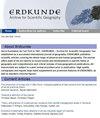The politics of development geographies: new partners, transdisciplinary perspectives. A conversation with Emma Mawdsley
IF 1.1
4区 社会学
Q3 GEOGRAPHY
引用次数: 0
Abstract
This contribution centres around a conversation with Emma Mawdsley, held at Goethe-University Frankfurt on 31 January 2019 in the context of the closing events of the programme on ‘Africa’s Asian Options’ (AFRASO) – a large interdisciplinary research programme, funded by the German Ministry for Education and Research (BMBF) between 2013 and 2019. During this time, we investigated the heterogeneous spaces of interaction between Africa and Asia; it closed with a lecture series, entitled ‘Afrasian Futures’ during which Emma Mawdsley delivered the final lecture. In this contribution, we address contemporary debates and the evolution of development geography, focussing in particular on Mawdsley’s rich contributions as regards the role of ‘new’ development partners, such as China and so called ‘emerging economies’, and South-South cooperation as well as on transdisciplinary connections of the subdiscipline. It starts with an introductory part in form of a brief reflection on the role of development geography in the wider context of academic engagement with the broad complex of ‘development’, in particular as regards the interdisciplinary field of ‘development studies’. In the following we highlight two key aspects of Mawdsley’s work and contribution to such research: i) a long-term shift away from North-South towards South-South relations; and ii) an emphasis on socio-political dimensions of development geography through feminist and queer perspectives. Following an initial introduction, the remainder of the contribution consists of a conversation with Emma Mawdsley.发展地理政治:新伙伴、跨学科视角。与Emma Mawdsley的对话
这一贡献围绕着2019年1月31日在法兰克福歌德大学与Emma Mawdsley的对话展开,该对话是在2013年至2019年间由德国教育和研究部资助的大型跨学科研究项目“非洲的亚洲选择”(AFRASO)的闭幕式上进行的。在这段时间里,我们研究了非洲和亚洲之间的异质互动空间;会议以题为“非洲的未来”的系列讲座结束,Emma Mawdsley在讲座中做了最后的演讲。在这篇文章中,我们讨论了当代的辩论和发展地理的演变,特别关注Mawdsley在“新”发展伙伴(如中国和所谓的“新兴经济体”)的作用、南南合作以及该分支学科的跨学科联系方面的丰富贡献。它以介绍性部分的形式开始,简要反思发展地理学在学术界参与“发展”的广泛复杂性的更广泛背景下的作用,特别是在“发展研究”的跨学科领域。在下文中,我们强调了Mawdsley工作的两个关键方面以及对此类研究的贡献:一)从南北关系向南南关系的长期转变;以及ii)通过女权主义和酷儿视角强调发展地理学的社会政治层面。在最初的介绍之后,文章的其余部分包括与Emma Mawdsley的对话。
本文章由计算机程序翻译,如有差异,请以英文原文为准。
求助全文
约1分钟内获得全文
求助全文
来源期刊

Erdkunde
地学-自然地理
CiteScore
2.00
自引率
7.10%
发文量
17
审稿时长
>12 weeks
期刊介绍:
Since foundation by Carl Troll in 1947, ''ERDKUNDE – Archive for Scientific Geography'' has established as a successful international journal of geography. ERDKUNDE publishes scientific articles covering the whole range of physical and human geography. The journal offers state of the art reports on recent trends and developments in specific fields of geography and comprehensive and critical reviews of new geographical publications. All manuscripts are subject to a peer-review procedure prior to publication. High quality cartography and regular large sized supplements are prominent features of ERDKUNDE, as well as standard coloured figures.
 求助内容:
求助内容: 应助结果提醒方式:
应助结果提醒方式:


